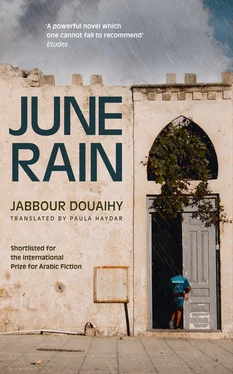‘We knew Fuad and his brother Butros. They used to have drinks sometimes on the balcony with your father, and Kamileh would bring them mezze . We could smell the grilled meat and hear their laughter from here. Some evenings Fuad al-Rami would persuade Kamileh to sing. Your father would encourage her and she would send out her ataaba and mijana tunes into the night, followed by a shy laugh and a long round of approval.
‘We were told later on that they had come to offer their condolences to Kamileh and that someone had brought them to her under cover of darkness. We weren’t able to hear what they were saying there on the balcony. They were whispering… When the electricity came back on, the light bulb on Kamileh’s balcony lit up. The two men were sitting with your mother and her friend Muntaha. I stayed in my spot on the sofa until morning, until my mother woke up and tugged my shoulder telling me to go sleep in my bed. All the time I sat there, in between nodding off, I would lift my head and look in the direction of your house, and actually I’m no longer certain exactly what time I looked and didn’t see anyone on the balcony anymore.’
Everyone reached wits’ end as the fighting dragged on.
Yusuf Saeed al-Rami reached his wits’ end, too.
He had been forced to stop ploughing his olive groves and pruning his trees with his rough hands and spraying them with the sprayer he carried on his shoulder. His grove in the lower village of Al-Hariq was exposed to the enemy. Yusuf had received a warning from one of his old friends, a childhood friend, though childhood was a very long time ago now that Yusuf was almost seventy. His friend sent him the news secretly with Father Boulos, which was to tell Yusuf that the last time he went to look after his olive trees his enemies spotted him from behind the barricade set up on the roof of the monastery, and next time he wouldn’t be able to escape their bullets.
‘They’ll kill you, Yusuf,’ Father Boulos told him. ‘Stop going up to Al-Hariq. You all have suffered enough.’
His enemies were waiting for a new German rifle with a telescope to arrive any day.
Yusuf didn’t have anything left in the world except that olive grove.
He was at odds with his neighbours and his relatives. They didn’t like him and he didn’t like them. He started throwing stones at them one day because of how much they mocked him. He’d pass by them without greeting any of them. And he was at odds with his wife Salimeh and with his five sons — four of whom he still had and one who’d been hit. They never asked for his opinion and he never offered one. They ate without inviting him for lunch. They died and didn’t ask him anything. Their mother was in charge of them.
He had planned to build a room for himself in the olive orchard where he could sleep and get away from Salimeh. He hadn’t had any friends for a long time. His old friend in the Lower Quarter, who sent him the warning about the German rifle with the telescope, was connected to Yusuf more by the memory of their friendship than by the friendship itself.
He used to go to Al-Hariq in order to flee the house and the neighbourhood. He’d stay there until nightfall, battling the thorns and building a stone border he had no need for, by himself, with his own hands — just to avoid going home too early.
And now here he was stuck at home. He was too old to fight and didn’t want to fight, either. He counted the days until he could go back to the olive orchard.
Salimeh al-Hamati, his wife, had also reached her wits’ end.
She showed disdain for anyone who weakened, gathered and collected information about them, and publicised it in a loud voice wherever she went. She wasn’t afraid of anyone. ‘So-and-so’s wife took him to her family’s town so he could hide there under her skirt. What a pity of a man! So-and-so sold two boxes of ammunition instead of using them in battle so he could put the money in his pocket. So-and-so claims he’s sick every time they ask him to join the fight.’
She lashed at everyone with that tongue of hers, starting with her own ‘strong-armed’ relatives and her husband’s relatives. She blasted them with the harshest words, right to their faces if she saw them, whenever she found they were preparing to flee with their children to safer places.
‘Their children are in school,’ she’d say, ‘and they don’t want them to lose a single year of their life while our children are here in the barricades defending their honour.’
Her children’s job was to fill the sandbags with sand. They piled them up on the rooftops and watered them so they would be impenetrable to the bullets. Then they poured all the gunfire and curses they had over those sandbags.
For others, those were carefree and comfortable days, but for them, they were days of war.
People called them ‘Salimeh’s boys’.
There were five brothers: Hashim, Saeed who they called ‘Abu Ali’, Francis, Shakir (‘Abu Layla’) and DeGaulle. One of them — Saeed — had been killed in the early battles. He might have been the first casualty of the war of the barricades. A grenade he was holding and inspecting before throwing it at the enemy exploded in his hands. Another one of her sons was wounded, too — DeGaulle, the youngest. He was shot in the back and the injury left him crippled. Every day around noon he would leave his barricade to get lunch from the house and take it to his brothers. No doubt they had been lying in wait for him when they spotted him. They shot one bullet at him, from a longbarrel rifle; the shot came from Muhsin al-Semaani’s barricade, which was directly across from theirs. Muhsin al-Semaani was Husneh’s brother. Her day would come. Salimeh watched her son DeGaulle as he tried to get to the bathroom, tripping on his way. She called out to one of his brothers to help him. They had promised to get a wheelchair for him, but wheelchairs were very expensive. In the meantime, DeGaulle just lay there in front of her, flat on his back.
She pounded her chest and called for evil to befall whoever had shot him, prayed for whoever it had been to be paralysed by a stroke and live a long, long time.
They reached their wits’ end as the fighting went on and on… and they still wanted more… Until one day at the end of September, when a man stood in the doorway of the cobbler shop and asked, ‘Where’s Husneh?’
The man was one of those men who fought alongside Salimeh’s boys. He posed the question to all of us, all four of us sitting in chairs there in the store. Two of us were working — Abboud, the store owner, and myself, and the other two were regulars who were used to spending some of their time there in the mornings. Like us, they were no good at fighting or barricades. My father had wanted me to learn the trade young, and the fact of my young age also allowed him to say I wasn’t qualified for battle. Abboud used to look after me. He would let me do the gluing and the pounding of nails in the beginning, but he wanted me beside him at all times for another reason, too, which was to relate to him what the others were saying. I was his ears. We were in the middle of exchanging bits of conversation and the previous night’s news when the man appeared. Because the battles usually flared up at night and quietened down in the morning, the fighters slept during the day.
The others didn’t know the man who asked us the question, and I didn’t know him either. But it wouldn’t have been appropriate to ask who he was. As usual, I repeated the question in a loud voice into Abboud’s ear. ‘Where is Husneh?’
Husneh was his wife. I had just seen her a few minutes earlier carrying a bag of vegetables on her way into the house in the back of the store, but I decided to let her husband answer in whatever way he wanted to.
Читать дальше












